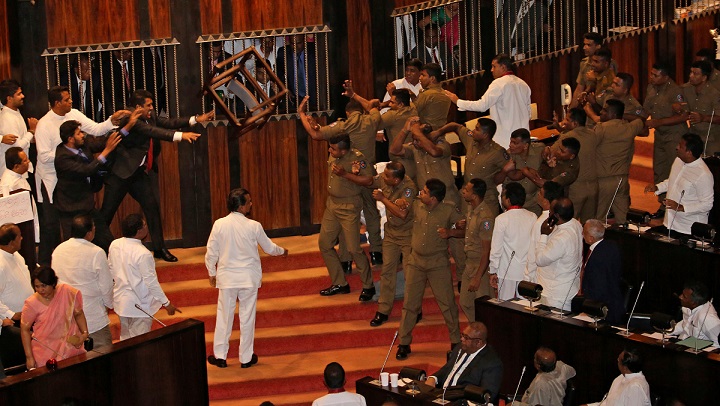Image: Pro Rajapaksa parliament members attacking the speaker.(File photo courtesy of NYT)
Arguing that under present circumstances, the course of action most consistent with the Constitution is to summon the dissolved Parliament, which can continue until the end of August 2020 the Centre for Policy Alternatives has requested the President to summon the Parliament that has been dissolved in order to address these concerns and ensure that the functions of government can continue in a lawful manner and that citizens can participate in the electoral process without endangering public health.
The statement issued by the Centre for Policy Alternatives follows:
22nd April 2020, Colombo, Sri Lanka: The Centre for Policy Alternatives (CPA) notes the Election Commission’s announcement that parliamentary elections will be held on 20 June 2020. This announcement comes during a period in which the number of persons who have tested positive for Covid -19 continue to increase and the “curfew” and quarantine measures imposed by the Government continue to be operational in several parts of Sri Lanka.
The Constitution requires that Parliament be summoned three (03) months from the date on which it is dissolved. The new date set for elections by the Election Commission falls outside this time period and is clearly unconstitutional. The Constitution requires a functioning Parliament to be in place in the Republic in order to ensure the functions of Government can be carried out. The only exception to this is the period in which Parliament is dissolved for elections. However even in this exceptional situation, the Constitution makes ample provision to ensure that Parliament can be called upon to perform its functions as and when the need arises. These constitutional provisions are not an accident, they are the personification of the fundamental idea that Sri Lanka is a Constitutional Republic.
CPA is also concerned that in light of the continued global pandemic and the ground situation within Sri Lanka, there does not exist a conducive environment for the conduct of a free and fair election. Elections are a process and the right to franchise is not protected unless citizens can freely participate in the entire electoral process. As the Government’s own guidelines demonstrate, there is a need to maintain social distancing and follow precautionary measures even when the “curfew” is no longer in operation. As such there is a need for several changes to the election law, at least on a temporary basis, to deal with this reality and to ensure the citizens right to franchise is protected. These changes can only be made by Parliament and cannot be imposed by executive action.
CPA has already raised concerns regarding the absence of a functioning Parliament and highlighted the implications of this on public finance and oversight over the Government’s response to the Covid–19 pandemic. Furthermore, Parliament will have to make changes to existing laws or enact new laws in order to ensure continued economic activities in light of the challenging situation created by the Covid–19 pandemic.
In these circumstances, the course of action most consistent with the Constitution is to summon the dissolved Parliament, which can continue until the end of August 2020. CPA notes that this is also the course of action that would be most in line with protecting public health and the citizens’ right to franchise.
CPA therefore requests the President to summon the Parliament that has been dissolved in order to address these concerns and ensure that the functions of government can continue in a lawful manner and that citizens can participate in the electoral process without endangering public health.
